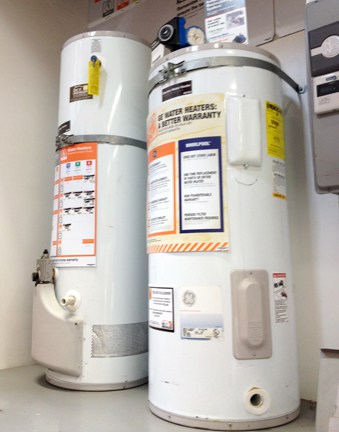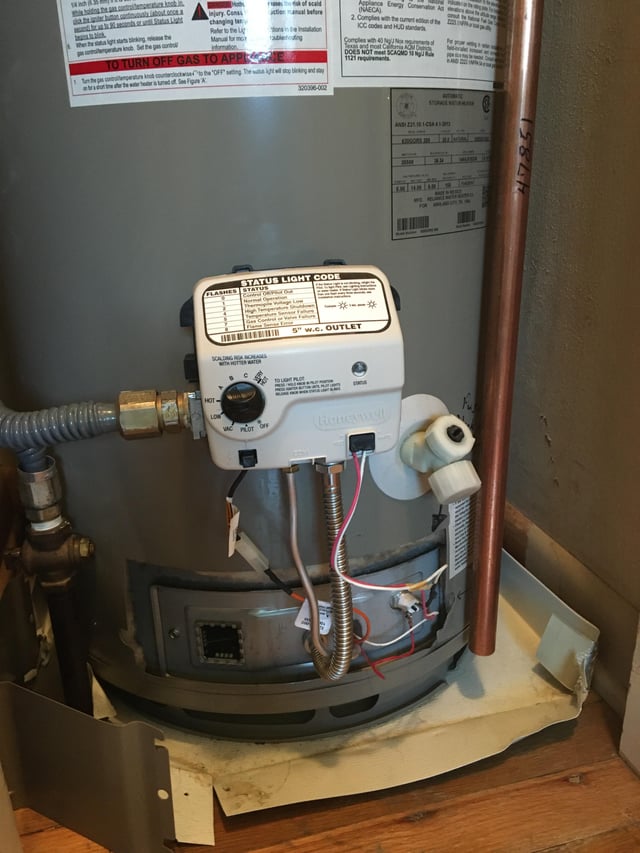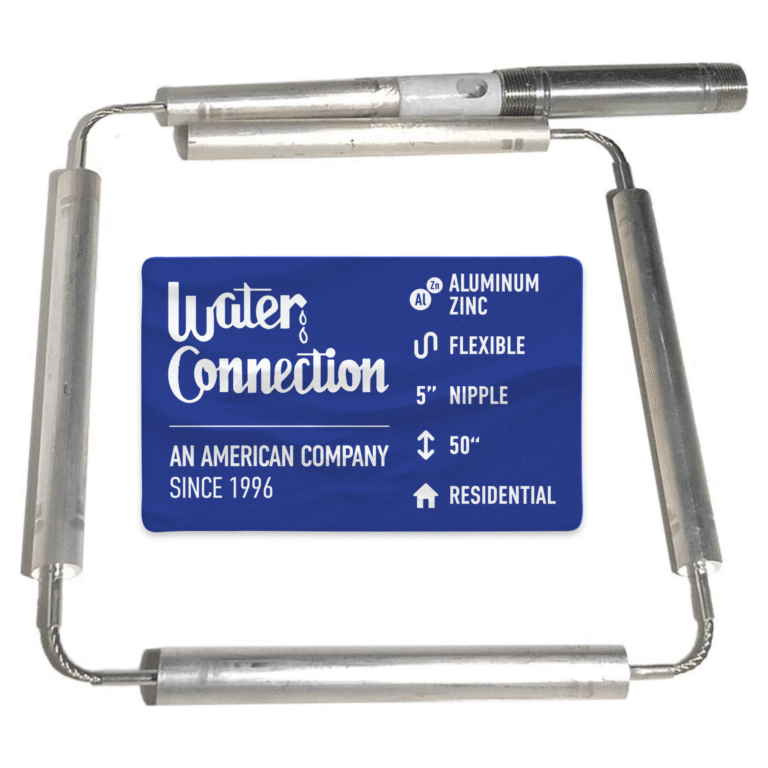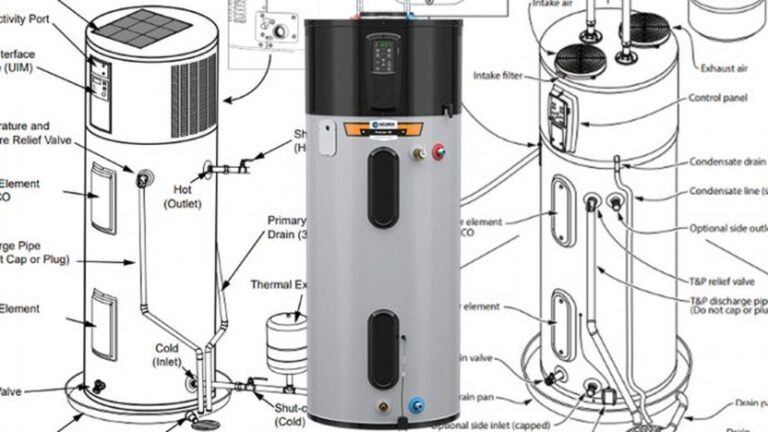Are you in the market for a new water heater but feeling stuck between choosing a 50-gallon or a 75-gallon model? You’re not alone.
This is a common dilemma for many homeowners looking to balance efficiency, cost, and comfort. But what if making the right choice could save you money, enhance your daily routine, and even boost your home’s value? Imagine never having to worry about running out of hot water during your morning shower or while washing dishes after a family dinner.
We’ll break down the key differences between the 50-gallon and 75-gallon water heaters, helping you make an informed decision that meets your needs. From installation costs to energy efficiency, we’ve got you covered. Stay with us, and by the end, you’ll feel confident in choosing the perfect water heater for your home.

Credit: www.hometips.com
Size And Capacity Differences
Choosing between a 50-gallon and 75-gallon water heater depends on household size. A 50-gallon heater suits smaller families, while larger ones benefit from a 75-gallon model. Consider space and usage needs when making a decision.
When choosing between a 50-gallon and a 75-gallon water heater, understanding the size and capacity differences is crucial. These differences can significantly impact your home’s comfort and energy efficiency. Let’s break down these factors and see which might be the best fit for your space and needs.Space Requirements
The size of your water heater will directly affect where you can install it. A 50-gallon water heater typically measures around 60 inches in height and 20 inches in diameter. On the other hand, a 75-gallon unit is bulkier, often reaching up to 70 inches tall and 24 inches wide. Consider your available space. Do you have a dedicated utility room, or will the heater be tucked away in a closet? A personal anecdote: my friend once had to knock down a wall to fit a larger heater—it was a costly mistake. Assess your space carefully to avoid such issues.Household Needs
Your household’s water consumption plays a significant role in deciding the right size. A 50-gallon water heater might suffice for a family of three or four. It can handle daily showers, dishwashing, and laundry without running out of hot water. However, if your family is larger or if you have higher water usage, a 75-gallon heater might be more suitable. Imagine running multiple showers simultaneously while the dishwasher and washing machine are on. A larger tank ensures you won’t be caught mid-shower with cold water. Think about your daily routine. Do your kids take long baths, or do you often have guests? Your lifestyle will dictate your needs more than anything else. Choosing the right water heater size is not just about fitting it into your home but also ensuring it fits your life. What are your unique requirements?Energy Efficiency
Energy efficiency is a crucial factor when deciding between a 50-gallon and a 75-gallon water heater. It’s about how effectively these appliances use energy to heat water, impacting both your utility bills and environmental footprint. Understanding this can help you make a decision that’s good for both your wallet and the planet.
Energy Consumption
Energy consumption is a key consideration. A 50-gallon water heater generally consumes less energy because it heats a smaller volume of water. This can translate into lower energy usage, especially if your household doesn’t require large amounts of hot water daily.
On the other hand, a 75-gallon water heater might be more efficient if you frequently need large quantities of hot water, like for a big family or frequent guests. It can heat more water at once, potentially reducing the need for multiple heating cycles.
Cost Implications
Understanding cost implications involves looking beyond the initial purchase price. While a 50-gallon water heater might be cheaper upfront, consider the long-term costs. It could be more cost-effective if your hot water needs are minimal, saving you money on energy bills.
If you need more hot water, a 75-gallon water heater might be a better investment despite the higher initial cost. Think about how much you spend on heating water currently. Could a larger tank reduce your monthly expenses by operating more efficiently?
Have you ever considered how much energy your household really uses? Assess your hot water needs carefully before making a choice. An energy-efficient decision today can lead to significant savings tomorrow.
Installation Considerations
Choosing between a 50-gallon and a 75-gallon water heater requires careful thought. One major aspect you need to consider is the installation. Whether you choose to hire a professional or decide to take the DIY route, each option has its own set of advantages and challenges. Understanding these can guide you in making an informed decision that suits your needs and skills.
Professional Installation
Opting for professional installation can save you a lot of time and stress. Experts bring years of experience, ensuring the job is done right the first time. They also handle all the necessary permits and codes, which can be a maze for those unfamiliar with them.
However, this service comes with a cost. Depending on your location and the complexity of the installation, you might find it a bit pricey. Yet, the peace of mind and safety it offers can be worth the investment.
Diy Installation Pros And Cons
Do you enjoy taking matters into your own hands? A DIY installation can be rewarding and cost-effective. You can save money and gain a sense of accomplishment from completing the task yourself.
But, consider your skill level and the potential risks involved. Are you comfortable handling electrical and plumbing tasks? Mistakes can lead to costly repairs and even safety hazards.
Also, check if your local regulations allow DIY installations. Some areas may require professional work for compliance with safety codes.
So, what’s your take? Do you value the learning experience, or would you rather leave it to the pros? Your choice could impact not only your finances but also your peace of mind. Choose wisely!

Credit: www.dimensions.com
Performance And Output
Choosing the right water heater size impacts performance and output. A 50-gallon heater and a 75-gallon heater offer different benefits. Understanding these differences helps in making an informed choice.
Heating Speed
Heating speed matters for quick hot water access. A 50-gallon heater heats water faster. It has less water to heat. This makes it ideal for smaller households. A 75-gallon heater takes longer. It heats more water. Ideal for larger families needing more hot water.
Recovery Rate
Recovery rate defines how quickly a heater replenishes hot water. A 50-gallon heater recovers quickly. It suits homes with moderate hot water use. A 75-gallon heater has a slower recovery rate. It handles high-demand situations better. Great for homes with multiple showers or appliances running simultaneously.
Maintenance And Longevity
Choosing between a 50-gallon and a 75-gallon water heater isn’t just about size and capacity; it’s also crucial to consider maintenance and longevity. These factors can significantly impact your home’s comfort and your wallet. A well-maintained water heater can extend its lifespan, saving you money on replacements and repairs. So, let’s dive into the routine maintenance needs and durability aspects of these water heaters.
Routine Maintenance Needs
Routine maintenance is essential to keep your water heater functioning efficiently. Both 50-gallon and 75-gallon models have similar maintenance requirements, but the larger capacity of the 75-gallon unit means it might need a bit more attention.
Regularly checking the temperature setting is a simple task. Keeping it at 120 degrees Fahrenheit is ideal for energy efficiency and safety. Are you doing this already?
Flushing the tank annually is another key maintenance task. This helps remove sediment buildup, which can affect performance. A friend once told me how skipping this step led to lukewarm showers. You don’t want that!
Inspect the pressure relief valve periodically. It’s a small component, but it plays a big role in safety. Ensure it’s functioning properly to prevent pressure buildup.
Durability And Lifespan
Durability is often a top concern when investing in a water heater. The lifespan of a water heater typically ranges from 8 to 12 years, but regular maintenance can help you reach that upper limit.
The 50-gallon water heater usually has fewer components, which might mean fewer things can go wrong. Does simplicity appeal to you?
On the other hand, the 75-gallon model is built to handle larger volumes, often with more robust construction. My cousin chose this for their large family and found it consistently reliable over the years.
Consider the material of the tank. Stainless steel tanks can offer better resistance to corrosion, potentially extending the lifespan. Would investing a bit more upfront be worth it for peace of mind?
Ultimately, the choice between these two models should factor in your specific needs and lifestyle. Understanding maintenance and longevity can lead to informed decisions that benefit your home in the long run.

Credit: x.com
Cost Comparison
Choosing between a 50-gallon and 75-gallon water heater depends on cost. Both initial and long-term expenses play a vital role. Understanding these factors can help you make an informed decision.
Initial Purchase Price
The initial cost is a significant factor in decision-making. A 50-gallon water heater usually costs less than a 75-gallon model. This is due to the smaller size and capacity. Prices can vary based on brand and features. Budget-friendly options are often available for both sizes. Consider your budget before making a purchase.
Long-term Expenses
Long-term expenses include energy usage and maintenance costs. A 75-gallon heater might consume more energy. This can result in higher electricity or gas bills. Regular maintenance can also impact costs. Larger units may require more frequent servicing. Evaluating these factors can ensure a cost-effective choice.
Environmental Impact
When choosing between a 50-gallon and a 75-gallon water heater, it’s crucial to consider the environmental impact of your decision. Water heaters can have significant effects on energy consumption and carbon emissions. Understanding these impacts can help you make a choice that aligns with your values and potentially reduce your household’s ecological footprint.
Eco-friendly Options
Both 50-gallon and 75-gallon water heaters come with eco-friendly features. Many modern water heaters offer energy-efficient models that minimize energy use. They might include features like better insulation and smart technology to reduce standby heat loss.
Consider looking for water heaters with the Energy Star label. This indicates that the appliance meets energy efficiency guidelines set by the Environmental Protection Agency. Choosing an efficient model can save energy and lower your utility bills.
Carbon Footprint
The carbon footprint of your water heater depends on its size and efficiency. A larger 75-gallon water heater might consume more energy than a 50-gallon model, especially if it’s not energy-efficient. However, if your household needs more hot water, a larger heater might prevent frequent heating cycles, which can also conserve energy.
Think about your family’s water usage. If you find yourselves waiting for hot water often, it might be a sign that a larger, efficient heater could work better for you. On the other hand, a smaller, efficient heater can be ideal for smaller households.
What steps are you taking to reduce your home’s carbon footprint? It might be time to evaluate the appliances contributing to your energy use.
User Reviews And Feedback
User reviews highlight the efficiency and cost-effectiveness of 50-gallon water heaters for smaller households. For larger families, 75-gallon models receive praise for their ability to provide ample hot water during peak usage times.
When choosing between a 50-gallon and a 75-gallon water heater, user reviews and feedback can offer valuable insights. These firsthand experiences often reveal the real-world performance and satisfaction levels of each option. You might find that what works for one household may not work for another. Let’s dive into what customers have been saying.Customer Satisfaction
Many customers appreciate the 50-gallon water heater for its efficiency in smaller households. It often meets the needs of families who don’t require excessive hot water. People who opt for the 75-gallon water heater often praise its ability to handle larger demands. If you have a big family or use multiple water outlets simultaneously, this might be your best bet. Consider your lifestyle. You might love the convenience of never running out of hot water with the larger option. But, if energy consumption is your concern, the smaller heater could be more appealing.Common Complaints
Some users of 50-gallon water heaters report running out of hot water during peak usage times. Imagine showering after a long day only to find the water turning cold halfway through. On the flip side, 75-gallon water heaters can sometimes be seen as overkill. You may find them consuming too much energy for your needs. This could lead to higher utility bills, a concern for energy-conscious users. Installation space and cost are frequent complaints. The larger heater might require more room and a higher upfront investment. Would the benefits outweigh these drawbacks for your specific situation? Ultimately, understanding user reviews can guide you in making the right choice. What’s your priority—energy efficiency or abundant hot water?Choosing The Right Water Heater
Choosing the right water heater can feel like navigating a maze of options. With so many factors to weigh, it’s easy to feel overwhelmed. Whether you’re considering a 50-gallon or a 75-gallon water heater, making an informed choice will ensure you have the hot water your household needs without wasting energy or money.
Factors To Consider
When deciding between a 50-gallon and a 75-gallon water heater, several factors come into play. Think about your household size. A larger family will naturally need more hot water. For instance, a family of four might find a 50-gallon heater adequate, while a larger family might benefit from a 75-gallon tank.
Consider your daily water usage habits. Do you run multiple showers, a dishwasher, and a washing machine simultaneously? If so, a 75-gallon heater might prevent those cold water surprises. Compare the energy efficiency of the models you’re considering. A larger tank might use more energy, but newer models often have improved efficiency features.
Making The Decision
Once you’ve weighed the factors, it’s decision time. Picture your busiest morning: kids showering, someone doing laundry, and you trying to wash dishes. Would a 75-gallon heater offer peace of mind? Or would a 50-gallon model suffice because you stagger your water usage?
Think about installation space. Do you have room for a larger unit? A 75-gallon heater requires more space, which could be a deal-breaker for smaller homes. Consider future needs too. Are you planning to expand your family or home? A bit of foresight might save you from upgrading again later.
Choosing between a 50-gallon and a 75-gallon water heater isn’t just a matter of size. It’s about aligning your choice with your lifestyle and future plans. What’s your current comfort level with your water heater situation? Taking the time to assess your specific needs ensures you make a smart, efficient choice.
Conclusion
Choosing between a 50-gallon and 75-gallon water heater depends on your needs. Consider family size and water usage. A 50-gallon unit suits smaller households. It’s compact and energy-efficient. Larger families benefit from a 75-gallon heater. It offers more hot water for busy mornings.
Installation space and budget also matter. Both options have pros and cons. Evaluate your priorities carefully. Think long-term savings and comfort. Consult a professional if uncertain. They can guide your decision. Making the right choice ensures satisfaction. Your home stays warm and efficient.



